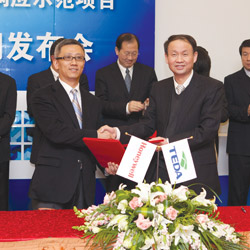
|
| Aldous Wong, vice president and general manager for Honeywell Building Solutions in North Asia, shakes hands with Ai Yamin, deputy director of TEDA, at the signing ceremony. |
MINNEAPOLIS — Honeywell International recently announced an agreement with the Tianjin Economic-Technological Development Area (TEDA) to implement China’s first smart grid demand response project.
State Grid Electric Power Research Institute (SGEPRI) selected Honeywell to develop the project in February. The agreement represents the official launch of the demand response system pilot, jointly sponsored by the U.S. and Chinese governments through the U.S.-China Energy Cooperation Program (ECP), which aims to develop a nationwide set of smart grid industry standards in China.
Under the agreement, Honeywell will conduct a demonstration project using its automated demand response (Auto DR) technology at select facilities within the TEDA development area, including government and commercial facilities, and industrial plants.
Buildings account for approximately 70 percent of all electrical use and a majority of greenhouse gas emissions worldwide. Honeywell’s smart grid technology and expertise connects utilities and their customers to automatically adjust energy consumption to reduce demands on the electrical grid.
With Honeywell’s Auto DR technology, customers establish customized energy-reduction strategies for their facilities, which are put into action by utilities during demand-response events. Through Auto DR, utilities can quickly and reliably reduce overall energy consumption during peak-use periods, and commercial customers can cut energy use and costs without compromising critical operations. Auto DR also helps reduce greenhouse gas emissions and the need to run expensive peak power plants, which typically sit idle until customers require more electricity than the utility is able to provide using its primary, base-load generators.
Honeywell officials state that deployment of Auto DR can effectively reduce peak loads by 15 to 30 percent and, when done at scale, can create the effect of a virtual power plant that generates “negawatts” — or reduced demand — instead of megawatts. The project will help TEDA improve its investment and operational profile, as well as make a contribution to energy efficiency and the environment.
As the world’s largest energy user, China seeks to develop a smarter electrical grid to better manage the country’s growing demand for energy and improve the reliability and efficiency of the nation’s utility infrastructure. Adding intelligence to the grid will enable utility customers, such as energy-intensive commercial and industrial operations, to better manage how and when they use their energy based on its availability and price.
“We are honored to join hands with Honeywell to conduct China’s first smart grid demand response project at TEDA,” said Ai Yamin, TEDA deputy director. “This is a very important energy saving initiative for TEDA on our mission to build a resource-efficient and environmentally friendly environment. We are committed to making this pilot project successful, and look forward to deploying the Auto DR technology more broadly in the future.”
“Cutting demand and consumption is the cheapest and cleanest source of energy, and this project will create the bridge between the utility and its customers to make using less easy and automatic,” said Stephen Shang, president of Honeywell China. “With the unique combination of advanced technology, energy experience, and expertise from Honeywell, I am sure this demonstration project will not only bring economic benefits to TEDA, but will support the development of relevant standards and regulations for the broader deployment of smart grid solutions in China.”
Publication date: 01/23/2012

Report Abusive Comment